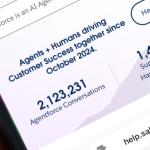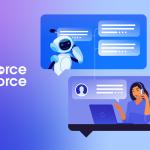Artificial intelligence is reshaping how all businesses operate — from improving customer experiences to streamlining operations. But for CIOs, it’s not just about keeping up with the latest innovation. They’re under pressure to find AI solutions that actually deliver by creating real value, scaling effectively, and integrating with existing systems. While 84% believe AI will be as transformative as the internet, many still face major barriers to making it work at scale. Our latest report, The Three Things CIOs Really Want from AI, explores these challenges and solutions.
We spoke with 150 CIOs from across the world to understand what they need from AI and what barriers are hindering the successful implementation of AI projects. Our survey showed that only 11% of CIOs have fully implemented AI, despite the majority acknowledging its potential to enhance their business operations. Key challenges include technical and organisational hurdles, particularly around data security and infrastructure.
At the same time, many CIOs feel pressured to be AI experts, with 61% admitting they are expected to know more about AI than they do. Interestingly, while 77% of CIOs reported good or excellent backing from their executives, concerns over unrealistic ROI expectations and the readiness of various business functions continue to slow AI adoption.
The Three Things CIOs Really Want from AI
We spoke with 150 CIOs from across the world to understand what their top priorities are.



The pitfalls of DIY AI
Many organisations are exploring in-house AI development, but this path can be more complex and costly than it first appears. Challenges such as maintaining real-time data accuracy, ensuring strong governance, and integrating AI smoothly into existing systems are often underestimated. As a result, 30% of generative AI projects are predicted to be abandoned after the proof-of-concept stage by the end of 2025, according to a report by Gartner. A recent study from the United States Artificial Intelligence Institute (USAII) highlights the rapid growth of AI in ASEAN. AI projects in the region increased by 80% in 2023, with budgets expected to rise by 67% in 2024-2025. However, a major hurdle is the lack of AI providers with large-scale capabilities within ASEAN, with China being the closest hub. Additionally, the high costs and financial risks associated with large-scale AI adoption push many companies toward smaller-scale data analytics solutions.
There’s no doubt that AI holds game-changing potential. But with enterprise AI deployments costing anywhere from $5 million to $20 million, the investment can be daunting — particularly without a clear strategy in place. Furthermore, a recent survey by Gartner found that 63% of organisations either don’t have or are unsure if they have the right data management practices for AI, putting many projects at risk before they even begin. With AI tasks becoming more complex, managing these systems without the right expertise is becoming increasingly challenging, resulting in rising costs.
What CIOs really want from AI
As we enter the era of agentic AI, the stakes couldn’t be higher from a financial and reputational perspective. Concerns over data security and the gap between AI expectations and reality are significant barriers for organisations trying to adopt AI.
To truly deliver value, AI must address three critical concerns for CIOs: AI needs to understand your business; it needs to be scalable; and it must integrate seamlessly into your existing ways of working.
Find out what CIOs Really Want from AI
Eighty-four percent of CIOs say AI will be as significant to their business as the internet.



1. AI that knows your company (and customers)
AI is only as effective as the data it can access. Off-the-shelf AI models often lack the contextual understanding needed to serve a specific business effectively. As such, CIOs need AI solutions that can securely access enterprise data while maintaining strict governance and privacy controls. It must also be able to understand business operations and customer interactions while staying up to date with the latest insights.
Agentforce achieves this through built-in Retrieval Augmented Generation (RAG), ensuring AI remains accurate and relevant. According to our data, concerns over data security directly correlate to lower AI usage at work. This highlights the importance of AI solutions that can securely leverage existing infrastructure and business logic without compromising sensitive data.
2. AI that delivers value fast and can adapt as your company scales
Many AI pilots stumble before they scale — usually because they’re hard to integrate and pile up technical debt. CIOs aren’t just looking for AI that works. They want solutions that are modular, scalable, and built to grow with their business.
That’s where pre-built, adaptable platforms come in. They help teams move faster, cutting down the time it takes to see real results — without the headache of heavy customisation or starting from scratch. The road from pilot to production is rarely smooth. Most AI tools just aren’t ready to plug into the systems, data, and workflows companies already rely on.
Agentforce changes that. You get a deeply integrated agentic platform that seamlessly connects to your existing infrastructure — helping you scale faster, reduce complexity, and skip the pain of one-off solutions.
3. AI that integrates across the enterprise
AI shouldn’t be confined to isolated functions. Standalone AI tools create fragmented value, but enterprise-wide integration ensures that insights and automation flow across systems, multiplying impact and justifying the investment at scale. Today’s CIOs need AI solutions that cut across departments: from customer service to sales, marketing, and IT operations.
The most effective AI isn’t just smart, it’s connected. When AI is integrated across departments, it can tap into a complete data picture. That enables better insights, smarter automation, and more consistent decision-making across the business.
Agentforce is built with this in mind. Its modular design gives AI agents the flexibility to operate across channels and functions — always with the right context to get the job done. Whether it’s improving customer experiences or making internal processes more efficient, Agentforce helps you put AI to work across the entire business.
To explore how data can power more intelligent and trustworthy AI, we’ve broken it down in this guide to data-centric AI. Here, we’ve highlighted why putting high-quality, well-governed data at the centre of your AI strategy is essential for achieving reliable outcomes at scale.
By addressing these critical concerns, AI can truly deliver value to businesses, helping them navigate the complexities of digital transformation and stay competitive in an ever-evolving market.
The future of enterprise AI
The key to successful AI adoption lies in trust, security, and seamless integration. Organisations that can harness AI effectively will gain a competitive advantage, while those that struggle with fragmented or DIY approaches may face increasing challenges.
Agentforce isn’t just another AI tool; it’s a complete enterprise agentic platform designed to scale autonomous AI agents throughout your enterprise. It works by using the power of an LLM and connected data to identify what work needs to be done, build a plan to do the work, and then execute the plan, entirely autonomously.
Ready to take your AI to the next level? Download the report today!
Download the Three Things CIOs Really Want from AI Report
Learn what it takes for AI to pay off faster at enterprise scale.






















![[Illustration] A customer service rep works with an AI agent in a contact center](https://www.salesforce.com/ap/blog/wp-content/uploads/sites/8/2025/07/Reshaping-customer-service-roles-with-AI_Article-2_1500x844.jpg?w=150&h=150&crop=1&quality=75)

